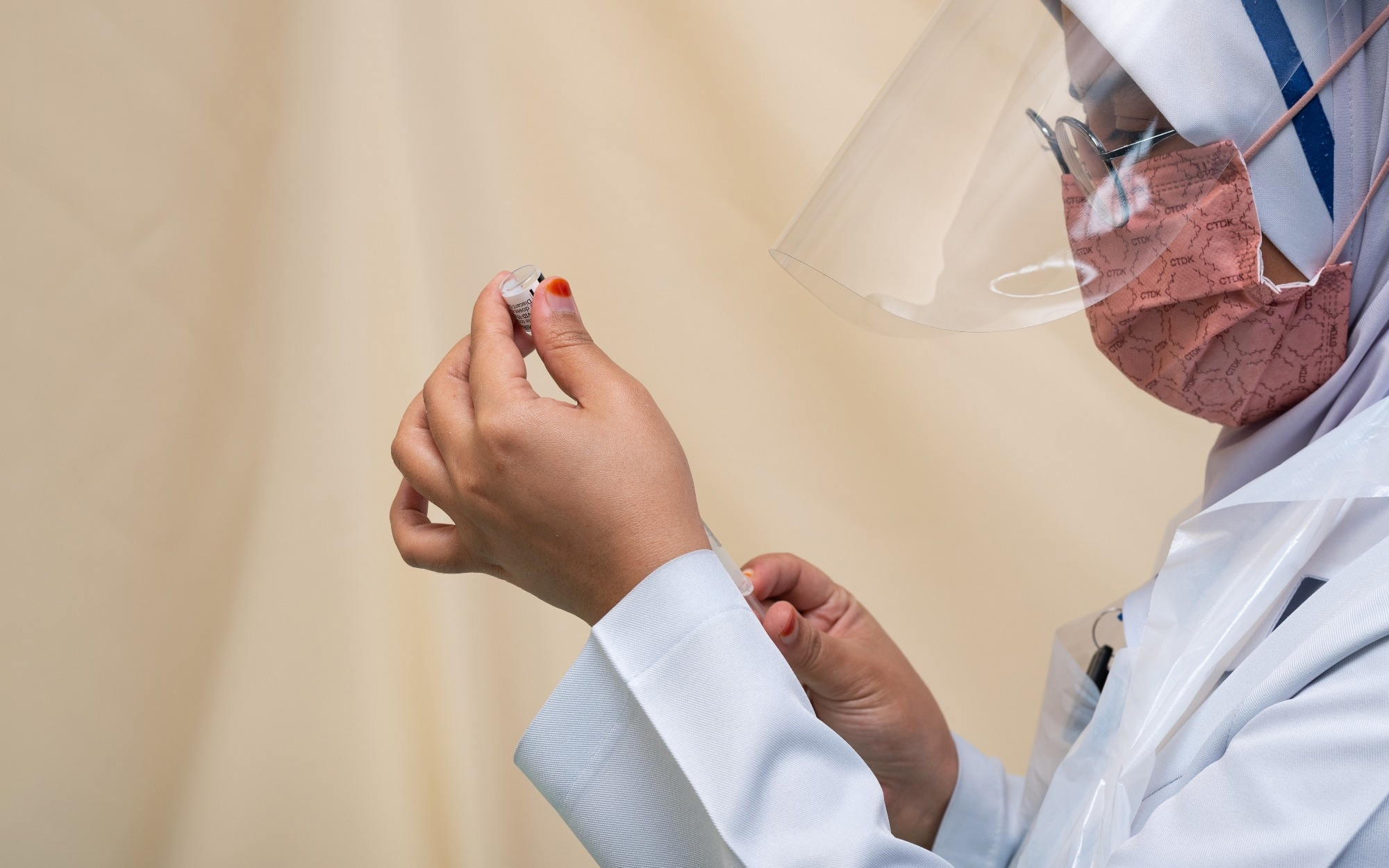In a recent study published in the journal Eurosurveillance, researchers estimated the effectiveness of bivalent messenger ribonucleic acid (mRNA) vaccines targeting the severe acute respiratory syndrome coronavirus 2 (SARS-CoV-2) Omicron BA.1 subvariant and the original Wuhan-Hu1 strain against Omicron infections in the vaccinated population of the Netherlands between 26 September and 19 December 2022.
The adult participants of this study self-reported SARS-CoV-2 infection, most likely caused by the Omicron BA.1 subvariant that was predominant in the Netherlands during the study period. These adults had received a primary-series COVID-19 vaccination and one or two monovalent booster doses before the study initiation.
 Study: Effectiveness of bivalent mRNA booster vaccination against SARS-CoV-2 Omicron infection, the Netherlands, September to December 2022. Image Credit: M HAZWAN H / Shutterstock
Study: Effectiveness of bivalent mRNA booster vaccination against SARS-CoV-2 Omicron infection, the Netherlands, September to December 2022. Image Credit: M HAZWAN H / Shutterstock
Background
Data are scarce on estimates of the effectiveness of bivalent vaccination against SARS-CoV-2 (re)infections, especially relative to currently used monovalent vaccines. A United States study recently documented that the Omicron-targeted bivalent vaccine conferred higher protection in individuals of different age groups than monovalent vaccination (46% vs. 38%). However, this study tested the newly developed bivalent vaccines targeting the spike (S) glycoprotein of Omicron BA.4/BA.5 subvariants. Also, the researchers did not stratify these estimates by individual's COVID-19 history.
Likewise, a preprint from the Nordic nations documented >75% efficacy of the Omicron BA.1-targeted bivalent vaccine against hospitalization in individuals aged 50 or above. Per Dutch surveillance data, the bivalent vaccine reduced the relative risk of reinfections by 58% in over 60 years old.
About the study
In the present study, researchers recruited two cohorts comprising vaccinated participants aged 18 to 59 and 60 to 85 years from an ongoing prospective cohort study called VASCO. They used Cox proportional hazard models to estimate the effectiveness of bivalent vaccination compared to primary and monovalent booster (one and two doses) vaccinations. The study model adjusted for age, gender, education, and the presence of a medical risk condition. The team presented these overall estimates stratified by the COVID-19 history of each participant.
Results
The study analyzed 32,542 and 12,988 participants aged 18 to 85-year-olds and 18 to 59-year-olds, respectively. Of these, 5,504 in the first and 11900 in the second cohort received a bivalent vaccine after 19 September 2022. The recipients of the bivalent booster shots were older and more vulnerable owing to a medical condition. Also, 58.2% of them had received two monovalent booster vaccinations. Accordingly, their average age was 51 vs. 48 years among 18 to 59-year-olds. Moreover, 26.5% and 39.2% of people in both age groups had a medical risk condition.
During most of the study period, the incidence of SARS-CoV-2 (re)infection was lower among participants who received an Omicron BA.1-targeted bivalent booster vaccine than those who did not. It had relative vaccine effectiveness (VE) of 31% and 14% in 18 to 59-year-olds and 60 to 85-year-olds, respectively, accounting for each participant's infection history.
Consistent with prior findings, the study data showed that a previous Omicron infection conferred more protection than bivalent vaccination, though the time since infection compared to vaccination was longer. Several previous studies have established that hybrid immunity confers higher protection against breakthrough infection than a vaccination or infection alone.
The researchers provided all VASCO cohort participants with SARS-CoV-2 antigen tests free of cost. Though bivalent booster dose recipients had a marginally more significant intention to test likely did not affect the study estimates. However, test frequency and differences in SARS-CoV-2 exposure due to one's behavior did not confound the study results or had a limited effect only.
Conclusions
The current study showed that bivalent booster vaccination marginally reduced COVID-19 hospitalizations, especially among older people or those at higher risk due to pre-existing comorbidities. However, these beneficial effects among recipients of primary and one/two monovalent booster vaccination and those with prior Omicron infection were limited.
Journal reference:
- Huiberts Anne J, de Gier Brechje, Hoeve Christina E, de Melker Hester E, Hahné Susan JM, den Hartog Gerco, van de Wijgert Janneke HHM, van den Hof Susan, Knol Mirjam J., Effectiveness of bivalent mRNA booster vaccination against SARS-CoV-2 Omicron infection, the Netherlands, September to December 2022. Euro Surveill. 2023; DOI: https://doi.org/10.2807/1560-7917.ES.2023.28.7.2300087, https://www.eurosurveillance.org/content/10.2807/1560-7917.ES.2023.28.7.2300087